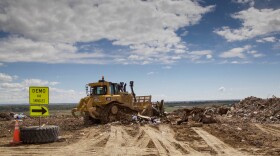Is recycling still worth it? It's a bold question — especially after decades of drilling into us the environmental value of recycling.
But China, who was the biggest global processor of materials, is no longer accepting shipments of plastics from the U.S. This has forced communities to find other ways to recycle these items, and that alternative can be costly.
Recycling is also hard. After decades of public messages, people still get it wrong, and sometimes those mistakes can affect an entire batch of materials.
KUNC hosts Kyra Buckley and Desmond O'Boyle visited three cities in Northern Colorado to find out how they are coping with the changing market.
Greeley
Greeley previously had a drop-off recycling center, which was operated initially through a grant, but was then taken over by contractors.
"We had a succession of three contractors eventually walk away from that and say that they couldn't make money," says Brad Mueller, Greeley's director of community development. "The city of Greeley does recognize the importance of recycling, but more importantly, waste diversion."
He says communities used to save money when recycling.
"Then, more recently (city-run recycling programs) could bring it to a distribution center and simply drop it off for no money," Mueller says. "Now to do that, they actually have to go and pay somebody to take that."
Greeley offers other programs, like an organic waste site where residents can take things like yard debris. They let private companies fill in the gaps with curbside pick-up for household recyclables.
Mueller says there is no plan to re-open a central location for people to bring household recycling.
Loveland
The Loveland Recycling Center is city-run and serves up to 140,000 people each year.
"We take hardbound books, we take plastic film, like grocery bags," says Tyler Bandermer, Loveland's solid waste superintendent. "We take concrete porcelain toilets, glass, tires. "

Bandermer looks like he just walked off a road crew, wearing a neon yellow safety vest and mirrored sunglasses. He says altogether, Loveland accepts more than two dozen types of goods, including things other centers won't take, like cooking oil and antifreeze.
At the Loveland center, regular items are free to drop off for residents and non-residents. There's a fee for harder-to-recycle things — and Bandermer says that fee is set just slightly higher than what it costs the city to dispose of it.
Bandermer says Loveland will continue its commitment to recycling even though it's not as profitable as it used to be. But he says to keep the practice sustainable, there needs to be more education on what actually is recyclable.
"If you're not sure, you probably need to throw it in the trash," he says. "Just because those contaminants, the more we get in there, the more messes up the system on the whole."
Fort Collins
The Timberline Recycling Center also takes hard-to-recycle items, just like Loveland.
"The sale of the materials that are collected here is certainly part of the funding model," says Caroline Mitchell, the lead waste reduction recycling specialist. "But the recycling drop-off center has never been self-sufficient and that has never been as assumption in its operating model. The city operates this as a service for the community."
The city helps subsidize the Timberline location, and Mitchell says that helps with the current challenges from the global market.

But she also says we're focusing too much on those low-value plastics that China isn't taking anymore.
"They are 2% of the weight of the materials that we collect curbside," Mitchell says, and that things like aluminum cans do still make some money.
However, Mitchell echoed the same sentiment other communities have: market value does not eclipse the environmental value of recycling.
Disclosure: Timberline Recycling Center is an underwriter for KUNC.











